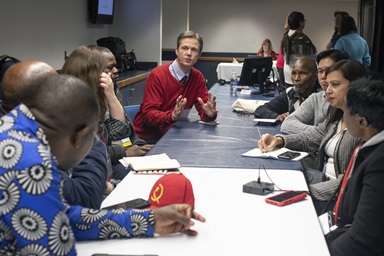How penalties imposed by trial courts were handled in two cases involving clergy was the subject of separate oral hearings Oct. 25 before the United Methodist Judicial Council.
The denomination’s top court, which met Oct. 25-28 at the Hyatt Regency Hotel in Lisle, Illinois, issued decisions on 11 docket items, including three related to the church’s position on homosexuality.
One hearing focused on the appeal of a decision of the Southeastern Jurisdictional Committee on Appeals. The committee upheld a decision related to the Jan. 11-12, 2016, church trial of the Rev. Errol Leslie by the Florida Conference.
The trial court found Leslie — who was serving a congregation in Florida in a cross-conference appointment — guilty of charges of sexual misconduct, immorality and disobedience to the order and discipline of The United Methodist Church. The court terminated his clergy membership in the New England Annual Conference.
The Rev. Scott Campbell, representing Leslie, said the appeal was based on fair process, judicial precedent and the authority of Judicial Council. He pointed to what he called errors in the supervisory process related to the complaint against Leslie and contended that the Florida Conference did not have the authority to try him.
“There should never have been a trial in Florida,” Campbell said. “There should never have been an appeal in the Southeast Jurisdiction. The entire matter should have been referred to New England.”
The Rev. Jay Therrell, a district superintendent serving as counsel for the Florida Conference, said that Leslie had admitted an extramarital affair that damaged his congregation and the church and violated his ordination vows. A few mistakes in process may have occurred, but none of those affected the outcome of his trial, Therrell said.
Judicial Council upheld the decision by the committee on appeals, ruling in Decision 1332 that the errors cited by Leslie did not affect the verdict or penalty.
Originally from Jamaica, Leslie retains his clergy membership in the Methodist Church of the Caribbean and Americas.
A separate docket item related to a decision by Bishop Sudarshana Devadhar, New England Conference, about a question of law in the Leslie case. In that item, the court ruled that a bishop does not have the authority to “make a substantive ruling” on what essentially is a petition for a declaratory decision.
“Questions pertaining to the constitutionality of an act of General Conference that fall within the jurisdiction of Judicial Council are beyond the scope of episcopal authority,” the court wrote in Decision 1331.
Second oral hearing
A second oral hearing addressed a request by the Texas Conference for a declaratory decision on matters relating to the final disposition of a penalty imposed on the Rev. Carla Badgett after a 2012 church trial.
The Rev. Jason Burnham, speaking on Badgett’s behalf, said the request to Judicial Council actually was “about everything that took place after the penalty (a three-to-five-year suspension) was handed down.”
He argued the Texas Conference Board of Ministry was wrong when it revoked the clergywoman’s credentials three years later, after she had complied with all the requirements of the suspension. The later action gave her no recourse for appeal, he said.
“The board of ministry acted as though this was a continuation of a trial, as though the trial never ended,” Burnham said. “The only thing that definitely ended was Rev. Badgett’s access to her rights.”
Mary A. Daffin, associate chancellor of the Texas Conference, said that Judicial Council had no jurisdiction in the case. Daffin said Badgett was not deprived of a right to appeal after the trial court made its decision.
In Memorandum 1336, Judicial Council agreed that it had no jurisdiction to consider how the conference board of ordained ministry handled penalties imposed by a trial court “when the concerned clergy person did not invoke her right of appeal…”
Additional decisions
In a case from the Illinois Great Rivers Annual Conference related to a trial court penalty imposed on a clergyperson, the Judicial Council referred to earlier rulings that a bishop has no authority to make substantive rulings on judicial or administrative matters.
While a conference can ask for a declaratory decision, the court said in Decision 1337, “an individual may not circumvent that process by merely requesting the presiding bishop for a decision of law so as to trigger an automatic review by the Judicial Council; to do so undermines the procedures and safeguards set forth in the Discipline.”
Other decisions issued by Judicial Council at its fall meeting involved questions over an appointment to extension ministry in West Ohio, the eligibility of a campus minister for nomination to a conference leadership team in West Michigan and a rule change on nomination of officers in Greater New Jersey.
See all decisions from Judicial Council's October 2016 meeting.
Bloom is a United Methodist News Service multimedia reporter based in New York. Follow her at https://twitter.com/umcscribe or contact her at 615-742-5470 or [email protected]
Like what you're reading? Support the ministry of UM News! Your support ensures the latest denominational news, dynamic stories and informative articles will continue to connect our global community. Make a tax-deductible donation at ResourceUMC.org/GiveUMCom.




